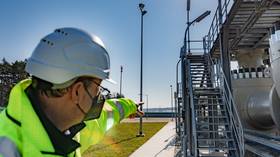EU announces plan for Russian gas substitute
The EU is planning to increase liquefied natural gas (LNG) imports from Nigeria amid concerns that supply from Russia may be cut, according to the deputy director general of the European Commission’s Energy Department.
“Europe is in a tight spot in relation to gas, following the Russian invasion of Ukraine and the instability in our gas market and the threat of cutting off supply altogether,” Matthew Baldwin said at a news conference in Abuja on Friday.
“So, we have launched the energy platform task force and the primary goal is to reach out to our reliable partners such as Nigeria to replace the gas from Russia with gas from reliable partners,” he said.
The EU is Nigeria’s major LNG buyer, with 60% of all LNG shipments from the country going to Europe, accounting for 14% of the bloc’s gas imports.
“We want to expand what is currently a 14% share of total LNG imports from Nigeria, we want that to go up,” Baldwin was quoted as saying.
He added that the EU is seeking to expand their short-term LNG deliveries from Nigeria, “but at the moment, the capacity, the utilization rate of Nigerian LNG is too low.”
Baldwin said his current trip to the African country is mainly focused on fact finding, but representatives will meet again in August for further discussions.
Commenting on the talks in Nigeria on his Twitter account, the European Commission official said there was “huge potential to replace Russian gas.”
The EU is the world’s largest LNG importer. In 2021, the bloc purchased 80 billion cubic meters of LNG. Among the union’s major LNG suppliers are the US (28%), Qatar and Russia (20% each), Nigeria (14%), and Algeria (11%).
Russia is Europe’s largest supplier of natural gas (41% of all EU gas imports as of 2021). However, in light of the situation in Ukraine, Europe earlier this year launched the REpowerEU plan, which focuses on lowering its dependence on Russian energy imports. These have recently dropped due to EU’s anti-Russia sanctions and their repercussions, Russia’s response, and technical problems. Europe now fears the situation could escalate and is seeking alternatives to Russian gas imports.
For more stories on economy & finance visit RT’s business section






Comments are closed.